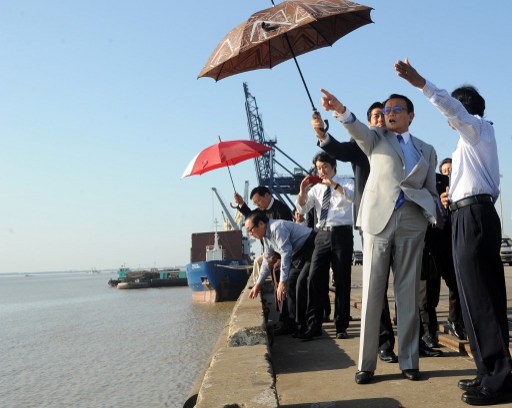Thailand and Burma seized control on Thursday of the multi-billion dollar Dawei special economic zone from Italian Thai Development Pcl to rescue the floundering project and convince foreign investors to finally come on board.
The takeover of the strategically located complex, billed as a gateway for trade with Southeast Asia, follows years of delays that have been blamed largely on the Thai firm’s failure to secure private investment and agree on a power source for the 250 sq km (100 sq mile) deep-sea port, petrochemical and heavy industry hub.
“If ITD continues, it’s impossible for new investors to come in,” Set Aung, a former economist and now a deputy central bank governor in Burma, said during a meeting of Thai and Burmese officials in Bangkok on Thursday.
The sidelining of ITD could pave the way for the involvement of Japanese industrial and hi-tech firms long established in neighbouring Thailand and who are fast taking advantage of investment opportunities in Burma since its new government introduced a raft of liberal reforms two years ago.
Set Aung told Reuters that Japanese companies had expressed interest in Dawei during talks a day earlier and would most likely announce their intentions next month in Tokyo when Dawei was due to be discussed on the sidelines of a regional meeting.
He said the focus was on getting the basic infrastructure in place in Dawei to attract Japanese firms.
That meant stripping ITD, Thailand’s largest construction group, of its 75-year concession to lead the project and hiring an international firm to carry out due diligence on work it has already started. That should be completed by May 2014 and ITD would be reimbursed for the work so far, the officials agreed at the meeting on Thursday.
[related]
ITD President Premchai Karnasuta said the company, which was granted the concession in the 1990s under a deal with Burma’s then ruling military, welcomed plans to overhaul and inject foreign capital into Dawei, also known as Tavoy.
“Our concession right has gone…but we still have the right to join auctions in several projects,” Premchai said, adding that ITD has invested around 6 billion baht ($189 million) in Dawei and it expects full reimbursement plus interest.
Located along the Thai-Burmese peninsular with highway links to industry hubs near Bangkok and along its eastern seaboard, Dawei is arguably Southeast Asia’s most ambitious industrial zone and a potential boon for firms relying on the transport of goods around the cumbersome Malacca Strait, the world busiest shipping lane.
Initial proposals included an $8 billion deep-sea port, a refinery, gas and coal power plants and steel mills. All these plans are set to be reviewed under any new agreement.
“We will bring a new project management company on board,” Thai Commerce Minister Niwatthamrong Boonsongpaisan said. “The next step is to find a new investor for phase one which includes roads, two small ports and light industries.”
Government involvement in Dawei is likely to boost Japan’s confidence in a project that faces problems ranging from a lack of basic infrastructure to conflicting information on power supply, funding, costs and planned facilities.
Dawei’s story stands in stark contrast to that of the 2,400-hectare (5,900-acre) Thilawa economic zone near Burma’s biggest city, Rangoon, which is moving ahead quickly following the establishment of a Burma-Japan joint venture involving Mitsubishi Corp Marubeni Corp and Sumitomo Corp as well as Japanese state support.
Japanese companies have enjoyed smooth ties with both Thailand and Burma. Japan is Thailand’s biggest foreign investor through its manufacturing bases for the likes of Honda and Toyota. Japan has also moved into Burma to work in sectors ranging from infrastructure to information technology, heavy industry and the stock market.
Masaki Takahara, head of the Japan External Trade Organisation in Burma, said Japanese firms were hesitant about ITD’s leadership and now would be drawn to Dawei once basic infrastructure was ready.
“I know a lot of Japanese companies will be interested in entering into Dawei,” he told Reuters. “I really support the development of this area. It’s a beneficial project for the entire ASEAN” area.



